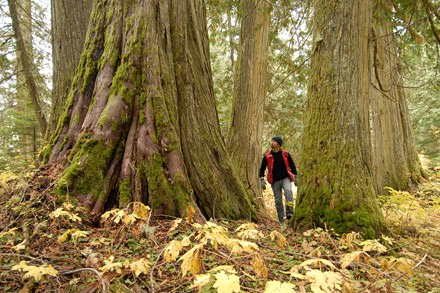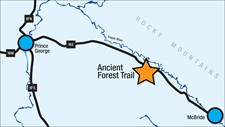Ancient Forest Not In Danger Says Bell
By 250 News
Thursday, May 22, 2008 04:59 AM

UNBC student Dave Radies in ancient forest east of Prince George, photo courtesy UNBC
Prince George, B.C. - The Minister of Agriculture and Lands, Pat Bell, has some concerns with the latest report from the Forest Practices Board.
The report follows an investigation into a public complaint about government's management of unique interior cedar-hemlock rainforests southeast of Prince George.
The Forest Practices Board has concluded the long-term preservation of rare forest sites is at risk.
"Some of these forest stands contain trees that are more than 1,000 years old. These same stands are favoured for logging, which compoundsthe risk of losing their contribution to biodiversity," said board chair Bruce Fraser. "Government's current legal requirements to protectold-growth and biodiversity in this area can be met without preserving
any trees older than 140 years. There are very few of these ancient forest site s remaining and they need protection."
s remaining and they need protection."
 s remaining and they need protection."
s remaining and they need protection."(at right, there is a trail that can be accessed east of Prince George , map courtesy UNBC)
The board is recommending that government develop an overall stewardship strategy to ensure high biodiversity values, such as ancient trees and rare lichens, are conserved in the inland rainforest, and that government use its existing regulatory tools to restrictlogging of these sites while such a strategy is being developed.
Called “B.C.'s Inland Rainforest” this forest contains hemlock and cedar forests that are a part of the interior cedar hemlock biogeoclimatic zone (ICH).
UNBC researchers recently discovered lichens in the canopies of these trees that are not known to occur anywhere else in the world.
Minister Bell says there is more information on this particular stand of trees which needs to be shared.
Bell points out this interior cedar hemlock stand, which is south east of Prince George between Purden Lake and McBride, was decimated by the hemlock luper about 30 years ago. “There are some who would have this entire forest protected and never selectively logged” says Bell, who says there needs to be careful consideration about plans for the future.
Bell says the day is not too far off when there will be a need to look for incremental stands of spruce to fill forestry’s needs for a mid term timber supply “We’re going to be looking for incremental stands wherever we can”. He says rather than cut off all logging, there needs to be an understanding that there is some spruce on these lands which will be the mid term supply of lumber needed to help the forestry sector get through the next 20 years.
He points out that TRC, the only company in the region that harvests cedar/hemlock has voluntarily withdrawn from harvesting in the area of concern. “There is no imminent danger to this forest, I just want to be cautious about making decisions today that will have an impact 20 years from now.”
Previous Story - Next Story
Return to Home









